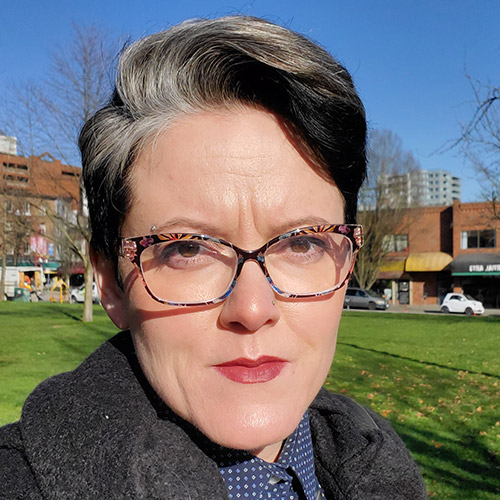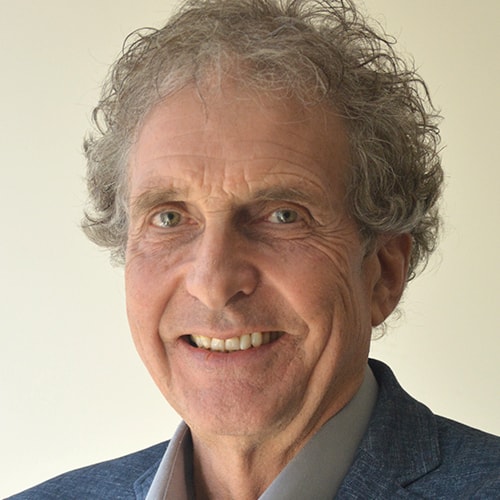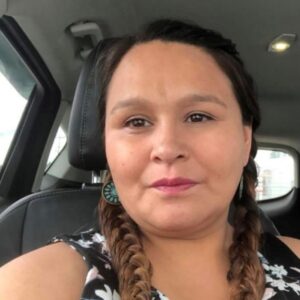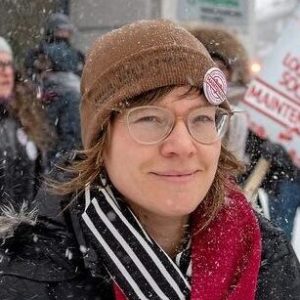Notre équipe
Le comité directeur et le personnel du Réseau national pour le droit au logement sont composés de leaders nationaux et internationaux dans le domaine du droit au logement, y compris des personnes ayant une expérience vécue. Ils sont responsables de la coordination générale des efforts du réseau. Cela comprend le développement de stratégies, l’engagement des membres de la coalition, les efforts de lobbying, l’établissement de relations avec les parties prenantes du gouvernement fédéral et la supervision financière.
Comité directeur

Anita Khanna est directrice nationale de la politique publique et des relations gouvernementales pour Centraide Canada. Avant d’occuper ce poste, elle était coordonnatrice nationale de la Campagne 2000 : Mettre fin à la pauvreté des enfants et des familles au Canada et directrice de l’action sociale et du développement communautaire à Family Service Toronto. Profondément attachée à la justice sociale et à l’équité, Anita s’est efforcée de rendre les services et la participation civique accessibles aux membres de communautés souvent marginalisées, en siégeant au conseil d’administration de la South Asian Legal Clinic of Ontario, en tant que directrice exécutive du Council of Agencies Serving South Asians (CASSA), en tant qu’organisatrice à l’échelle de la ville pour Social Planning Toronto, et en tant que membre du groupe consultatif communautaire de la Commission ontarienne des droits de la personne. L’expérience professionnelle et bénévole d’Anita couvre les domaines du logement, de la lutte contre la violence, de la défense des immigrants, des queers et des trans, de la lutte contre le racisme, du féminisme et de la jeunesse. Anita est titulaire d’une maîtrise en travail social de l’Université de Toronto et vit à Ottawa avec son partenaire et leur enfant.

Courtney Lockhart est gestionnaire de programme pour les politiques et les relations gouvernementales à la Fédération de l’habitation coopérative du Canada.
Elle développe les politiques et les relations gouvernementales de la FHCC afin de soutenir la croissance et le succès du secteur de l’habitation coopérative sans but lucratif. Plus récemment, elle a joué un rôle déterminant dans la promotion d’un investissement de 15 millions de dollars pour l’aide au loyer pour les ménages à faible revenu vivant dans des logements communautaires.
Courtney a récemment participé bénévolement à de nombreuses campagnes politiques aux niveaux fédéral, provincial et municipal. Elle possède une connaissance approfondie des institutions parlementaires et des activités de la circonscription parlementaire, et sait établir des relations avec les élus, leur personnel, la fonction publique et les organisations alliées.
Elle est déterminée à faire partie de la solution à la crise actuelle du logement, afin que tout le monde puisse disposer d’un logement sûr et abordable, quel que soit son revenu.
Courtney est titulaire d’une maîtrise en sciences politiques de l’Université Carleton et vit à Ottawa.

Danielle est avocate au sein du programme de droit communautaire du Community Legal Assistance Society (CLAS) et travaille principalement dans les domaines du logement et de la sécurité du revenu. Danielle a représenté des clients devant divers tribunaux administratifs, la Cour suprême, et la Cour d’appel de la Colombie-Britannique.
Avant de rejoindre le CLAS, Danielle a travaillé comme avocate à la First United Church, fournissant une assistance juridique, des conseils et une représentation aux personnes à faible revenu dans le Downtown Eastside de Vancouver dans le domaine de la loi anti-pauvreté. Danielle est titulaire d’une maîtrise en justice sociale et en communication et d’un doctorat en droit de l’Université de Windsor. Pendant ses études de droit, Danielle a travaillé comme étudiante clinicienne dans le domaine du droit anti-pauvreté pour Legal Assistance of Windsor.

DJ Larkin vit actuellement sur les terres des nations Lekwungen et W̱SÁNEĆ dans la région de Victoria, en Colombie-Britannique. DJ représente les gouvernements autochtones, élus et héréditaires, dans les litiges relatifs aux droits, à la terre et à la gestion des ressources. Auparavant, DJ a travaillé pendant plusieurs années à la Pivot Legal Society, représentant les personnes marginalement logées ou sans logement dans la défense de leurs droits constitutionnels, humains et locatifs. DJ a travaillé avec succès avec des communautés de personnes sans domicile pour défendre leurs droits constitutionnels et résister au déplacement, à la violence et à la criminalisation. En 2017-2018, DJ a co-enquêté et coécrit un rapport approfondi sur l’exclusion systémique et la marginalisation des personnes vivant à l’intersection de la pauvreté, de l’insécurité du logement et de la consommation de substances criminalisées, visant à créer une réforme législative et politique systémique. DJ s’engage à centrer l’expertise des personnes ayant une expérience vécue du sans-abrisme et, en tant qu’avocat, à trouver des moyens d’améliorer l’accès à la justice pour les personnes qui ont été historiquement marginalisées au sein du système juridique colonial du Canada.

Depuis 1995, Debbie travaille sans relâche à l’élimination de la pauvreté en Saskatchewan et au Canada. Elle a passé de nombreuses années en tant qu’avocate, activiste et chercheuse sur des questions sociales telles que le logement, le sans-abrisme, les questions relatives aux femmes et la pauvreté. Elle a notamment siégé pendant huit ans au conseil d’administration de Canada sans pauvreté et a récemment cofondé le Lived Experience Advisory Council Canada, qui a élaboré les « Sept principes d’inclusion ». Lorsque la Stratégie nationale sur le logement a été annoncée, Debbie a commencé à travailler avec Emily Paradis et d’autres personnes pour s’assurer que cette stratégie était fondée sur les droits de la personne, et elle continue de participer à ce travail.
Après avoir élevé ses enfants pendant 20 ans, Debbie s’est inscrite à l’université et a obtenu en 1998 un certificat et une licence en travail social autochtone.
Au cours des sept dernières années, Debbie a travaillé à Mumford House, un refuge pour femmes et enfants sans domicile fixe. Elle a quitté ce poste à temps plein pour travailler à Lighthouse Supported Living Inc, en tant que localisatrice de logement et, peu après, en tant que gestionnaire de cas de relogement rapide dans le cadre du programme « Housing First ».
La force de Debbie pour ce travail vient de sa propre expérience. Il n’y a pas de meilleure motivation que la frustration et la colère. Debbie a appris à utiliser son expérience, ses frustrations, sa colère et ses connaissances pour en faire de puissants outils de changement social. Debbie est également la fière maman de cinq enfants adultes et la grand-mère de 16 enfants âgés de 9 mois à 22 ans.

Bruce est directeur du Social Rights Advocacy Centre, boursier Maytree et a été commissaire à la Commission des droits de la personne de l’Ontario de 2016 à 2019. Il a été consultant en droits de la personne pour le Haut-Commissariat aux droits de l’homme, fournissant une aide à la recherche et à la rédaction pour les rapports du rapporteur spécial des Nations unies sur le droit au logement de 2014 à 2020. Il a codirigé un important projet de recherche collaborative du CRSH sur les droits sociaux au Canada de 2008 à 2018. Bruce a coédité trois livres sur les droits sociaux et publié plus de 40 articles et chapitres de livres, dont plusieurs sur les stratégies de logement et de lutte contre la pauvreté fondées sur les droits. Il a mené d’importantes réformes au sein du système des Nations unies pour l’accès à la justice en matière de droits sociaux et a coordonné des litiges sur les questions de logement et de pauvreté au Canada et à l’étranger, y compris quatorze interventions du Comité de la Charte sur les questions de pauvreté à la Cour suprême du Canada. Il a été le fer de lance de la collaboration entre les organisations de la société civile et les experts juridiques pour élaborer un projet de législation sur la stratégie nationale sur le logement, dont une grande partie a été incorporée dans la Loi sur la stratégie nationale sur le logement.

Je m’appelle Janine Harvey. J’ai 40 ans.
J’ai été adoptée par une merveilleuse famille inuite. J’ai grandi à Ulukhaktok, dans les Territoires du Nord-Ouest. J’ai déménagé à Yellowknife pour faire mes études en 1999. J’y ai vécu pendant 21 ans et je suis revenue récemment à Ulukhaktok.
J’ai cinq enfants et quatre beaux-enfants. Je suis mariée à mon mari Thomas Harvey. Je suis grand-mère de 8 petits-enfants.
J’ai commencé à travailler très jeune pour aider ma famille. J’ai travaillé pour le YWCA (travailleuse de soutien) et la Women’s Society (programme Housing First) pendant mon séjour à Yellowknife. J’ai reçu une bourse d’études de l’ACSE pour le travail que j’ai effectué dans le cadre du programme Housing First.
Je siège au conseil d’administration du PCVWH. Je siège également au conseil d’administration de Campagne 2000. Je suis membre du conseil d’administration du Fonds d’aide aux victimes des TNO. Je suis également conseillère de hameau dans ma communauté.
Je parle couramment ma langue. J’aime coudre des vêtements traditionnels, chasser, camper, pêcher et enseigner ma culture aux autres.
Je suis une mère, une épouse, une fille et une partisane de la culture inuit, une avocate, une survivante, et je consacre maintenant mon temps à aider d’autres personnes autochtones qui fuient la violence familiale.

Véronique Laflamme est organisatrice communautaire au sein d’organismes de défense des droits depuis près de 20 ans. Elle s’implique dans la lutte contre les inégalités sociales tant par son travail que par d’autres activités. Elle travaille pour le Front d’action populaire en réaménagement urbain (FRAPRU) dont elle est la porte-parole depuis 12 ans. Le FRAPRU est un regroupement québécois de plus de 140 organismes, dont 30 comités logement et associations de locataires de différentes régions, qui sont au cœur de son action pour le droit au logement. Depuis 42 ans, le FRAPRU travaille, entre autres, à la promotion et au développement du logement social. Elle est également active dans la lutte contre la pauvreté et pour la justice sociale. Véronique vit avec sa famille dans une coopérative d’habitation dont elle est membre fondatrice.
Véronique a été l’une des 40 lauréates du prix Hommage 40 ans de la Charte québécoise des droits et libertés, décerné par la Commission des droits de la personne et de la jeunesse du Québec, dans la catégorie droits économiques et sociaux.

Sam DiBellonia est responsable de la politique de Maytree, une fondation caritative privée canadienne qui se consacre à la réduction de la pauvreté et aux droits de la personne. Chez Maytree, Sam développe des positions politiques et des recherches qui se concentrent sur les moyens d’améliorer les programmes de logement et de soutien au revenu pour les personnes les plus démunies.
Avant de rejoindre Maytree, Sam a occupé diverses fonctions dans le domaine de la politique sociale dans les secteurs public et privé. Elle a notamment travaillé à la Direction des politiques de sécurité du revenu du ministère des Finances de l’Ontario, au sein de l’équipe chargée des rapports environnementaux, sociaux et de gouvernance (ESG) du Groupe Banque TD et au Secrétariat des politiques de développement social du Bureau du Conseil privé du gouvernement fédéral.
Sam est titulaire d’une maîtrise en politique publique de l’Université de Toronto et vit actuellement à Toronto.
Équipe

Michèle Biss (elle/elle) – Directrice exécutive
Michèle Biss est la directrice exécutive du Réseau national du droit au logement. En tant qu’experte en droits économiques et sociaux, elle a fait des présentations lors de plusieurs examens d’organes de traités des Nations Unies et devant des comités parlementaires canadiens. Avant de travailler pour le Réseau national du droit au logement, Michèle était directrice des politiques et avocate spécialisée dans les droits de la personne à Canada Without Poverty. En 2016, elle a été diplômée du cours avancé sur les droits économiques, sociaux et culturels de l’Université Åbo Akademi en Finlande. Elle possède une vaste expérience professionnelle dans la défense des groupes marginalisés, en particulier les femmes, les personnes en situation de handicap, les nouveaux arrivants et les personnes autochtones, qu’elle a acquise dans le cadre de dossiers, de travaux de recherche et de formations juridiques communautaires. Dans sa ville d’Ottawa, elle siège au conseil d’administration des Services juridiques communautaires d’Ottawa. Elle est avocate spécialisée dans les droits de la personne et a été admise au barreau de l’Ontario en 2014.

Misha Khan (elle/elle) – Responsable du développement stratégique
Misha est responsable du développement stratégique pour le Réseau national du droit au logement. Ayant immigré du Pakistan à un jeune âge, elle se consacre au développement et à la promotion d’espaces, de structures et de processus qui donnent la priorité aux personnes les plus marginalisées. Misha est diplômée du programme de psychologie de l’université Queen’s et possède une vaste expérience dans le secteur à but non lucratif, notamment à l’Atira Women’s Resource Society, à Martha’s Table et au Prison Journalism Project. Dans son rôle au sein du RNDL, Misha reste engagée dans la promotion de changements transformateurs et dans la défense du logement en tant que droit de la personne, en particulier pour les personnes qui ont été historiquement marginalisées.

Jessica Tan (elle/elle) – Responsable de la communication
Jessica est la responsable de la communication du Réseau national du droit au logement. Elle est diplômée de l’Université Carleton, où elle a obtenu une licence en commerce international avec une spécialisation en marketing. Jessica est passionnée par la justice sociale et a passé des années à faire du bénévolat pour des organisations environnementales telles que Ecology Ottawa et la Greenspace Alliance. Avant d’arriver au RNDL, elle a travaillé pour le Parti vert de l’Ontario où elle s’est battue pour des communautés plus solidaires, connectées et abordables. Jessica continue de lutter pour des logements abordables et des communautés plus équitables pour les générations actuelles et futures au sein du RNDL.

Ambalika Roy (elle/elle) – Coordinatrice de l’éducation juridique
Ambalika est coordinatrice de l’éducation juridique au sein du Réseau national du droit au logement (RNDL). Elle est avocate spécialisée dans les droits de la personne et a plus de quinze ans d’expérience en Inde, où elle a travaillé avec plusieurs organisations nationales à but non lucratif pour fournir un soutien juridique bénévole aux communautés marginalisées. Son travail s’est concentré sur l’accès à la justice pour les femmes, les personnes vivant avec le VIH et les communautés LGBTQI confrontées à une exclusion systémique fondée sur le genre, l’orientation sexuelle, l’identité de genre et la caste.
Ambalika s’est fortement impliquée dans des initiatives d’éducation juridique publique et d’autonomisation des communautés. Elle a contribué à plusieurs jugements juridiques historiques en Inde, notamment la reconnaissance du droit à la confidentialité pour les personnes vivant avec le VIH et l’affirmation du droit à l’identité pour les personnes transgenres.
Depuis qu’elle a immigré au Canada en 2019, Ambalika poursuit son engagement en faveur de la justice sociale. Elle a travaillé avec le Centre canadien des droits au logement (CCDH) et l’Échange sur l’engagement démocratique, engageant des communautés à travers le pays pour sensibiliser au droit au logement et à la participation démocratique. Ambalika est titulaire d’une licence en droit de l’université de Calcutta, en Inde.

Jay Sallos (iel) – Stagiaire en droit
Jay est né.e à Fredericton, à l’extérieur du bassin versant de la Wolastoq, sur la côte est. Iel est candidat.e au double diplôme BCL/JD à l’Université McGill, avec un intérêt particulier pour les droits de la personne, l’abolition carcérale et les droits au logement. Iel est le.la plus récent.e stagiaire de l’équipe R2HN!
Iel est membre du conseil consultatif de l’École des affaires publiques et communautaires, conférencier.e invité.e annuel.le pour le programme de criminologie et de justice pénale de l’Université St. Thomas, et membre de la Coalition pour le définancement de la police.
Jay a coécrit « Listening Beyond: Collaborative Reflections on Learning about Activism Through an Undergraduate Oral History and Podcasting Project » pour l’« Oral History Journal », ainsi que le livre blanc « Opportunities to Better Combat the Spread of Online Hate in Canada » dans le cadre d’un partenariat entre Patrimoine Canada et l’Institut montréalais d’études sur le génocide et les droits de la personne. Iel a également édité des textes universitaires sur la criminalisation de l’Autochtonie et de la maternité, dont Monstrous Mothers: Troubling Tropes and Unsettling the Canadian Criminal Justice System.

